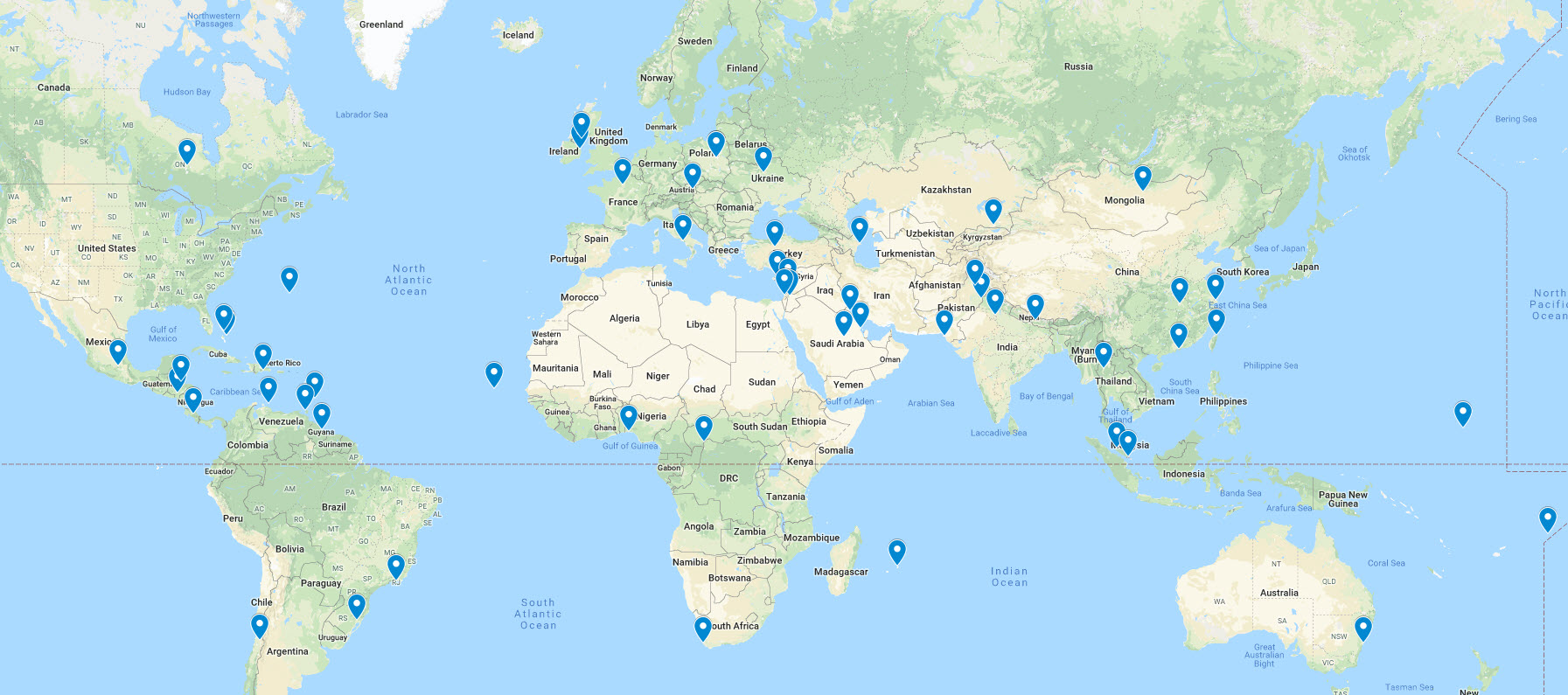Valuation is the cornerstone of Dunkin Advisors.
Cornerstone; a concept derived from the first stone set in the construction of a foundation. It is important since all other stones will be set in reference to this stone, thus determining the position of the entire structure.
Our full-service real estate consulting firm is based upon this cultural component which is metaphorically sacred. With empathy and personal service, we deliver a full range of real estate related services both foreign and domestic. Our company has obtained a high level of respect, built through decades of rapport.
International Appraisals
We have experience appraising a variety of property types, all over the world, for corporate and government agencies.

Expert Witness-Court Testimony
We provide Qualified Expert Witness testimony and pre-trial Depositions. Appearances include:
- United States Tax Court
- United States Bankruptcy Court
- State of Maryland Tax Court
- Baltimore City Circuit Court
- Various County District Courts
Conservation Easements
A conservation easement is a legal agreement between a landowner and a qualified organization that restricts future activities on the land to protect its conservation values.
- What is a conservation easement?
A conservation easement is a method of protecting our natural resources and preserving scenic open space and natural lands. The landowner who gives an easement gives up most or all of the rights to develop and subdivide the land, now and in the future, but still maintains ownership of the land. The organization accepting the easement agrees to monitor it to ensure compliance with its terms.
- What kinds of land can be protected by a conservation easement?
Any land whose conservation is in the public interest – woodland, wetlands, farmland, scenic areas, historic areas, wild and scenic rivers, undisturbed natural areas. MET will determine whether preservation of the land would confer a significant public benefit.
- Who owns land that is under an easement? Can it be sold?
The landowner who donated the easement remains the owner of the land. The land can be bought and sold as with all other land. However, the easement remains on the land and binds all future landowners.
- Why do landowners donate conservation easements?
Landowners donate easements as a conservation measure to protect and preserve land from development. Conservation easements are for individuals who have strong feelings about preservation of their land, an easement will assure that the land will never be used in a way contrary to their intent.
Benefits
- Donors may qualify financial benefits in the form of tax deductions associated with the easements.
- Tax deductions may be used to offset earned income over a 1 – 5yr period, or up to 15 yrs in some cases generally agriculture).
- Easements often make it much easier to pass on the land to the owner’s children without paying large estate taxes (Estate Taxes).
- Easements may make it difficult or impossible for government to condemn the protected land.
Disadvantages
- Easement restricts the developmental potential of a property; thus, the market value of the land may (will) be reduced.
- Easements are perpetual in nature, and apply to all present and future owners of the land. Under Federal tax law, no tax advantages are possible for easements that last only for a limited period of time.
- Does the Maryland Environmental Trust accept all easement offers?
Easement offers are evaluated on a case-by-case basis. MET staff members are available to visit potential easement sites and meet with interested landowners. The Board of Trustees and staff are guided by MET policy and the Internal Revenue Code; however, the final decision rests with the Board of Trustees.
- Will an easement grant the public access to my property?
No. The public benefit of conservation easements is usually derived from scenic views of the land from public roads or waterways.
- Can property owners still live on and use the land if they donate an easement?
Yes. For the convenience of the owner, easements usually allow for changes and additions to houses, construction of farm buildings, and other normal agricultural practices. Easements may be drafted in various ways. For example, some landowners decide that, for the protection of the land, all development rights should be excluded, so that the land will always look substantially as it does now. Another might decide that his parcel does not require this treatment. In this case, he might wish to allow his children the option of adding a limited number of future dwellings.
- How much is the gift of an easement worth?
The value of an easement gift, and therefore the amount of any tax deduction, varies with the individual easement. Usually, the more the easement restricts the uses of the property, the higher the value of the gift, and hence the higher the tax deduction. To determine the easement value, the land must be appraised at both its fair market value without the easement restrictions, and its fair market value with the easement restrictions. The difference between these two appraisals is the easement value, from which the tax deductions are derived. The MET does not do appraisals, but maintains a list of known appraisers.
- How do future owners of a property know that an easement exists?
The easement is recorded in the Land Records of the local (county) government. Any title search (generally done when land changes hands) will therefore reveal the existence of the easement. Even if future property owners are unaware of the existence of the easement, they remain legally bound by it. The MET does monitor easement properties regularly to make sure of compliance.
- Can Conservation Easements be donated by will?
Yes. The landowner should contact the MET office in advance; however, to ensure that MET will accept the gift, it is often better to donate an easement during ones lifetime, since otherwise one loses the income-tax benefits of the donation.
- Is land, which is subject to an easement, immune from condemnation?
An easement will protect from condemnation by a local (municipal) or county government. Legal research indicates that it will also protect from condemnation by the State, barring an express act of the Legislature. The Federal Government, however, can condemn an easement. As a matter of policy, County and State agencies consult with the MET in formulating their plans, and have avoided easement lands in the past.
- Is there a yearly deadline for donating an easement to the Trust?
No. The Maryland Environmental Trust will accept requests at all times. However, if you wish to donate an easement during a particular calendar year, you are advised to contact MET no later than September of that year.
Valuation Process
The valuation process is based on two values. The Before easement value and the After easement value. The difference or Diminution is the potential tax deduction.
Before Value (Pre-Easement)
- Current and future development rights based on zoning and restrictions.
After Value (Post Easement)
- Rights that exist after the implementation of the Deed of Conservation Easement.
Diminution (Tax Deduction)
- The reduction or decrease in value as result of the imposition of a Deed of Conservation Easement.
Estate Planning
Assisting clients with small and large portfolios.

